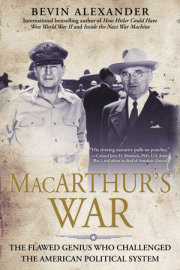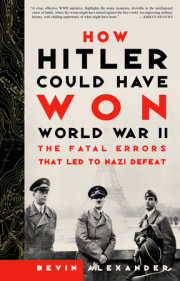“Bevin Alexander has superbly chronicled one of World War II’s most dramatic events. Inside the Nazi War Machine vividly recounts how Rommel, von Manstein and Guderian turned the Blitzkrieg into a fearsome weapon of war in France in 1940, and how Hitler botched his best opportunity to have defeated the BEF, and perhaps defeated Britain.”—Carlo D’Este, author of Patton: A Genius For War and Warlord: A Life of Winston Churchill at War, 1874-1945
“Bevin Alexander proves once again that he is a consummate master of historical analysis. This is the best single-volume examination to date of the new kind of ‘lightning warfare’ unleashed on the battlefield by the genius of Guderian, Manstein and Rommel. Armchair General magazine gives this must read book five stars, our very highest rating.”—Jerry D. Morelock, PhD, Col. U.S. Army, (Ret.), and Editor in Chief of Armchair General
“Bevin Alexander guides us from Nazi staff meetings to the tanks on the front lines, from generals to corporals, presenting in suspenseful detail the brilliance and blunders of army field commanders during those early, terrifying days of World War II. His descriptions of tactical situations are masterful, almost as if he himself had been present at the conflict.”—Forrest Bryant Johnson, Author of Phantom Warrior
“A thought-provoking study of a thinker, Manstein, a doer, Rommel, and a combination of both, Guderian, who together conceived, pursued and achieved a momentous victory despite the reticence, fears and obstructions of the German General Staff and Adolf Hitler himself. Bevin Alexander has compiled a telling testimonial to audacity, perspicacity and perseverance in the conduct of military operations that provides excellent lessons for the now and future leaders contemplating military action.”—General Frederick J. Kroesen, former vice chief of staff of the U.S. Army and Commander in Chief of U.S. Army Europe
“An important and exciting work. Bevin Alexander brilliantly evokes a time when history trembled. 1940—the war of speed and thrust that ripped through the heart of a continent. The boats at Dunkirk. Jackboots in the streets of Paris. And threaded through it all, the baffling insecurity of Adolf Hitler, which in the end was as effective as allied firepower.”—Harry Middleton, former director of the LBJ Presidential Library and Museum and author of LBJ: The White House Years










